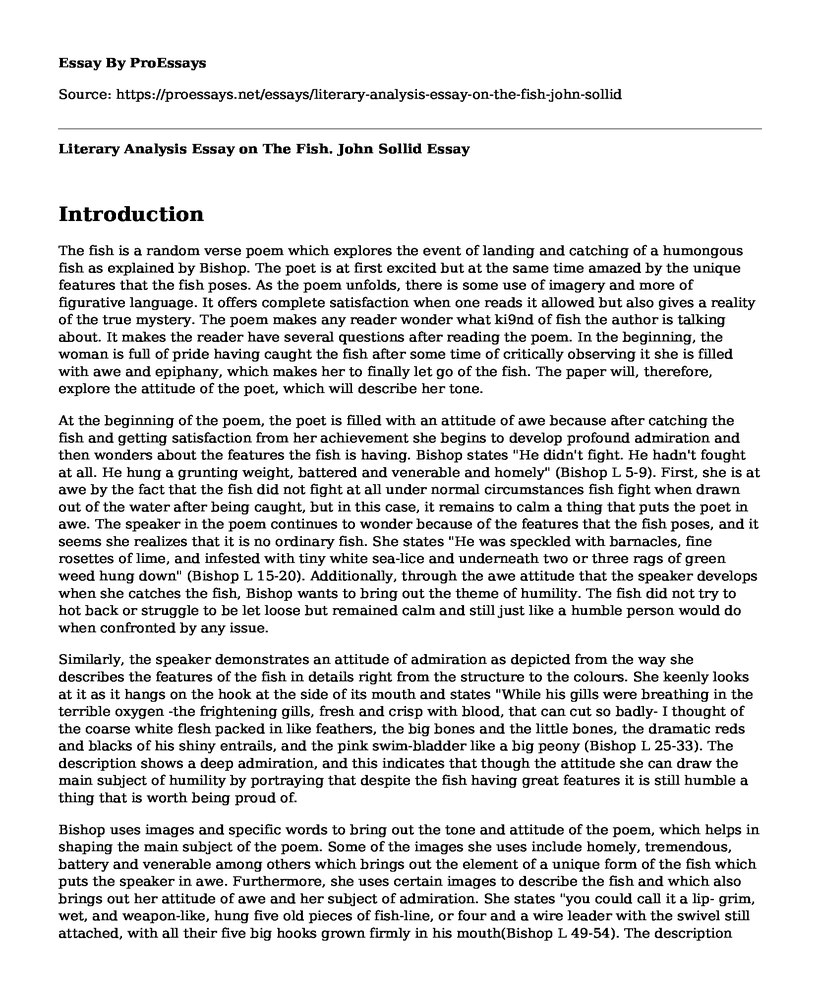Introduction
The fish is a random verse poem which explores the event of landing and catching of a humongous fish as explained by Bishop. The poet is at first excited but at the same time amazed by the unique features that the fish poses. As the poem unfolds, there is some use of imagery and more of figurative language. It offers complete satisfaction when one reads it allowed but also gives a reality of the true mystery. The poem makes any reader wonder what ki9nd of fish the author is talking about. It makes the reader have several questions after reading the poem. In the beginning, the woman is full of pride having caught the fish after some time of critically observing it she is filled with awe and epiphany, which makes her to finally let go of the fish. The paper will, therefore, explore the attitude of the poet, which will describe her tone.
At the beginning of the poem, the poet is filled with an attitude of awe because after catching the fish and getting satisfaction from her achievement she begins to develop profound admiration and then wonders about the features the fish is having. Bishop states "He didn't fight. He hadn't fought at all. He hung a grunting weight, battered and venerable and homely" (Bishop L 5-9). First, she is at awe by the fact that the fish did not fight at all under normal circumstances fish fight when drawn out of the water after being caught, but in this case, it remains to calm a thing that puts the poet in awe. The speaker in the poem continues to wonder because of the features that the fish poses, and it seems she realizes that it is no ordinary fish. She states "He was speckled with barnacles, fine rosettes of lime, and infested with tiny white sea-lice and underneath two or three rags of green weed hung down" (Bishop L 15-20). Additionally, through the awe attitude that the speaker develops when she catches the fish, Bishop wants to bring out the theme of humility. The fish did not try to hot back or struggle to be let loose but remained calm and still just like a humble person would do when confronted by any issue.
Similarly, the speaker demonstrates an attitude of admiration as depicted from the way she describes the features of the fish in details right from the structure to the colours. She keenly looks at it as it hangs on the hook at the side of its mouth and states "While his gills were breathing in the terrible oxygen -the frightening gills, fresh and crisp with blood, that can cut so badly- I thought of the coarse white flesh packed in like feathers, the big bones and the little bones, the dramatic reds and blacks of his shiny entrails, and the pink swim-bladder like a big peony (Bishop L 25-33). The description shows a deep admiration, and this indicates that though the attitude she can draw the main subject of humility by portraying that despite the fish having great features it is still humble a thing that is worth being proud of.
Bishop uses images and specific words to bring out the tone and attitude of the poem, which helps in shaping the main subject of the poem. Some of the images she uses include homely, tremendous, battery and venerable among others which brings out the element of a unique form of the fish which puts the speaker in awe. Furthermore, she uses certain images to describe the fish and which also brings out her attitude of awe and her subject of admiration. She states "you could call it a lip- grim, wet, and weapon-like, hung five old pieces of fish-line, or four and a wire leader with the swivel still attached, with all their five big hooks grown firmly in his mouth(Bishop L 49-54). The description brings out a unique image and element of admiration, which is the major subject that the speaker wants to bring out in the poem. Besides, by letting it go in the end shows that she was sympathetic with the fish another subject that the speaker brings out in the poem.
Work Cited
Bishop, Elizabeth, and David Ishii. The fish. John Sollid, 1974.
Cite this page
Literary Analysis Essay on The Fish. John Sollid. (2023, May 14). Retrieved from https://proessays.net/essays/literary-analysis-essay-on-the-fish-john-sollid
If you are the original author of this essay and no longer wish to have it published on the ProEssays website, please click below to request its removal:
- Grandmother's Victory by Maya Angelou Essay
- Essay on Who Was the Dark Lady of the Sonnets?
- Compare and Contrast Essay on The Scarlet Letter and Young Goodman Brown
- Rhetoric Evaluation and Analysis of Paradise Lost Essay
- Religion in "The Souls of Black Folks", "The Odyssey of Homer" and the "Holy Bible"
- Symbolism in Mark Twain's Adventures of Huckleberry Finn - Essay Sample
- Free Report Sample: Romanticism/Transcendentalism Questions







